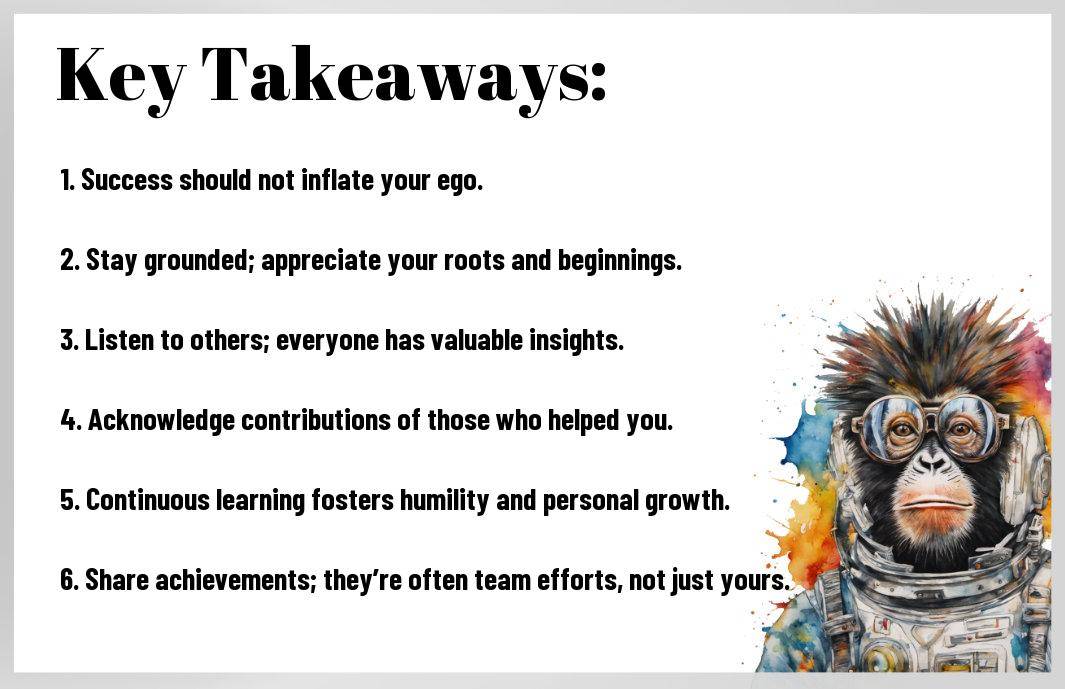
Newsletter Subscribe
Enter your email address below and subscribe to our newsletter

Enter your email address below and subscribe to our newsletter

Just as success can elevate you, it can also lead to a disconnect from those around you. Staying humble is not just about modesty; it’s about maintaining a grounded perspective of yourself and your achievements. I believe that true success comes from recognizing the contributions of others and understanding that your journey isn’t solely yours. Embracing humility fosters deeper connections and improves your leadership. For a deeper understanding, check out this insightful piece on Most Don’t Know The True Definition of Humility. It’s vital to balance ambition with a genuine respect for others.


While achieving success can easily inflate one’s ego, maintaining humility is vital for long-term growth and fulfillment. When we stay grounded, we foster connections and create an environment that promotes collaboration and innovation. As I navigate my journey, I recognize that Humility – Definition, Meaning & Synonyms plays a significant role in my personal and professional development.
Across various aspects of life, humility is recognized as the quality of being modest and respectful, acknowledging one’s limitations and the contributions of others. It’s about balancing confidence with the understanding that we don’t possess all the answers.
By embracing humility, I find that it enhances my relationships and opens doors to learning opportunities. A humble approach allows for constructive feedback, and it cultivates a positive atmosphere in both personal and professional environments.
Further, staying humble fosters authentic relationships built on trust and respect. When I approach others with a humble mindset, I create an atmosphere conducive to open dialogue and teamwork. It’s also vital for personal growth; I become more receptive to feedback and various perspectives. Ultimately, embracing humility not only enriches my success but also encourages those around me to thrive alongside me.
Even in history, we find numerous examples that teach us about the value of humility. Figures such as Mahatma Gandhi and Nelson Mandela showcased how humility can be a source of strength. Their characters are a reflection of true Humility | Character Strength. They demonstrated that despite their monumental achievements, staying grounded and connected to the people remains important.
Across various eras, leaders like Abraham Lincoln and Mother Teresa stood as testaments to humility. They navigated their immense responsibilities with grace, never allowing their status to blind them to the needs of others. Their actions encourage us to foster a similar mindset and lead by example.
Leaders like Martin Luther King Jr. and Anne Frank have imparted profound lessons on the significance of staying humble. With their *unwavering commitment to social justice and compassion*, they remind us that *true strength lies in service to others*. Their narratives highlight how *humility fosters connection and inspires change*, urging us to cultivate these values in our daily lives.
Your journey through life can be profoundly shaped by the practice of humility. This personality trait not only fosters self-awareness but also encourages a more realistic self-image. I have found that staying humble helps to counteract feelings of entitlement and promotes a more balanced outlook on success. Embracing humility allows you to remain open to learning, growth, and intrinsic motivation, which can significantly enhance your mental well-being.
Humility plays a vital role in maintaining mental health by promoting an adaptive self-perception. When I practice humility, it becomes easier to recognize my limitations and accept feedback from others, which reduces the pressure of perfectionism. This openness fosters resilience, encouraging me to cope better with stress and setbacks, ultimately enhancing my overall emotional well-being.
At the core of meaningful connections lies the quality of humility. By showing humility, I create an atmosphere of trust and understanding, which enhances my relationships with others. When I acknowledge my imperfections and approach interactions with an open heart, I pave the way for authentic communication and empathy. This approach fosters a sense of belonging and encourages deeper bonds based on mutual respect.
With humility in my interactions, I find that I can significantly enhance the quality of my relationships. Being open to others’ perspectives allows for collaborative problem-solving and reduces conflict. Furthermore, I’ve noticed that when I openly share my vulnerabilities, others feel more comfortable doing the same, creating a safe space for genuine connection. This practice not only strengthens my relationships but also cultivates a community where support and understanding are paramount, enriching my life in ways I had never anticipated.
Despite the challenges we face in maintaining a humble attitude, there are numerous effective strategies to incorporate humility into our daily lives. By actively engaging in practical approaches such as gratitude, self-reflection, and serving others, you can nurture a mindset that values humility alongside your achievements. These practices create a balanced perspective, allowing you to appreciate both your efforts and the contributions of those around you.
An necessary component of cultivating humility involves integrating small daily practices into your routine. Start each day by expressing gratitude for the opportunities you have and the people who support you. Additionally, seek out situations where you can lend a helping hand to others, reinforcing your understanding that everyone has a role to play in your journey.
Humility is often nurtured through intentional reflective practices that encourage self-awareness. I find that engaging in mindfulness exercises allows you to step back from your accomplishments and focus on your values and connections with others. By incorporating regular intervals of self-reflection, you gain a deeper understanding of both your strengths and areas for growth, fostering a more grounded sense of self.
Hence, by embracing reflective exercises and mindfulness, you create a space for honest self-assessment. This practice helps you to externalize your thoughts and emotions, leading to a clearer picture of your impact on others. It’s vital that you actively seek to challenge any inflated perceptions of self-worth you may have developed. Engaging in these exercises regularly can heighten your empathy and appreciation for others, further enriching your journey toward a fulfilling and humble existence.

Many great leaders understand that humility is a vital component of effective leadership. It fosters trust and collaboration, empowering team members to feel valued and supported. By embracing humility, leaders can create an environment where innovation and creativity thrive, ultimately driving the success of the organization. When leaders exhibit humility, they demonstrate a willingness to listen, learn, and adapt, which inspires others to follow suit.
About humble leadership styles, I believe they emphasize collaboration and open communication. Leaders who practice humility often prioritize their team’s needs over their own ego. This approach helps create an atmosphere of mutual respect, where everyone feels empowered to share ideas and contribute to decision-making. Consequently, such leaders tend to cultivate strong, resilient teams dedicated to achieving shared goals.
Role of encouraging humility in teams cannot be understated. By fostering this value within your group, you create a culture that values openness, empathy, and continuous growth. This leads to better collaboration and enhances team dynamics, allowing individuals to learn from one another. When humility is prioritized, it helps to reduce conflict and encourage innovative problem-solving. Ultimately, teams that practice humility become more adaptive and effective, saving time and resources while driving overall success.
Teams that encourage humility can significantly transform the work environment. When individuals are encouraged to share their mistakes and seek help from others, it fosters a culture of continuous improvement. This culture leads to open dialogue, which can prevent misunderstandings and conflicts. It’s vital that you set clear expectations regarding the importance of humility, as this reinforces its value in your team’s daily interactions. Regularly celebrating moments of humility will also motivate team members to practice it more often, ultimately driving greater success for everyone involved.
Now, I have come to realize that maintaining humility can be quite challenging, especially as I navigate through various successes and accolades. With each achievement, there are temptations and external pressures that can often overshadow my intrinsic modesty. I have encountered moments where pride threatens to take the forefront, and it’s crucial to recognize these challenges to keep my humility intact.
With success often comes external validation from peers and society, which can create a disconnect with my humble beginnings. This validation can lead to a distorted self-view if I allow it to define my worth. I must consciously challenge myself to keep my achievements in perspective and not let the admiration of others inflate my ego.
Arrogance can creep in quietly, often disguised as confidence, making it a slippery slope. It’s important for me to stay vigilant against feelings of superiority that can cloud my judgement. By actively seeking feedback and listening to others, I can keep my ego in check and remain grounded, even in times of success.
Overcoming ego and arrogance requires ongoing self-reflection and a commitment to personal growth. I find it crucial to engage in practices that ground me, such as mindfulness and expressing gratitude for my journey. Acknowledging that my successes are often the result of teamwork and support from others helps me remain humble. Embracing a mindset of learning rather than competition allows me to focus on improvement, making it easier to resist the temptations of arrogance.
With these considerations in mind, I believe that humility plays an imperative role in achieving and maintaining success. As you navigate your journey, staying humble ensures that you remain grounded and open to learning from others, regardless of your accomplishments. It fosters stronger relationships, cultivates respect, and encourages a continual pursuit of improvement. By embracing a humble mindset, you can enjoy your achievements without losing sight of the values that brought you there, ultimately leading to greater fulfillment and impact in your personal and professional life.
A: Staying humble means maintaining a modest view of one’s own importance and achievements. It involves recognizing that, despite success, there is always more to learn and room for growth. Humility encourages openness to others’ feedback and a willingness to assist and uplift those around you.
A: Humility plays a significant role in ensuring that success does not lead to arrogance or entitlement. It allows individuals to foster strong relationships, remain approachable, and continue to gain insights from various perspectives. This mindset can lead to sustained personal and professional growth and a supportive environment.
A: Success can sometimes result in an inflated sense of self-worth. When individuals achieve their goals, they may become focused on their accomplishments and overlook the contributions of others or the efforts that led to their success. This can diminish empathy and collaboration, which are crucial for personal and communal growth.
A: To cultivate humility, practice gratitude by acknowledging others’ contributions, seek constructive criticism and feedback, reflect on personal achievements without boasting, engage in community service, and actively listen to others’ opinions and ideas. These actions help to ground one’s perspective and nurture a humble attitude.
A: Yes, humility and confidence can coexist beautifully. Confidence is about believing in your abilities without feeling the need to prove oneself superior to others. When someone is genuinely confident, they are secure enough in their skills to acknowledge others’ strengths and celebrate collective achievements, enhancing both personal and group dynamics.
A: Humility fosters an environment of trust and respect in professional settings. Colleagues are more likely to collaborate and communicate openly with someone who is humble. This facilitates the sharing of ideas, strengthens teamwork, and can lead to improved productivity and morale within the organization.
A: Practicing humility is a continuous journey rather than a one-time effort. It requires ongoing self-reflection, awareness, and commitment to personal growth. As circumstances change, challenges arise, and new successes are achieved, individuals must continually examine their attitudes and behaviors to nurture humility throughout different phases of life.